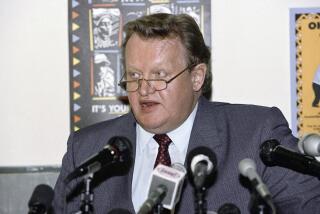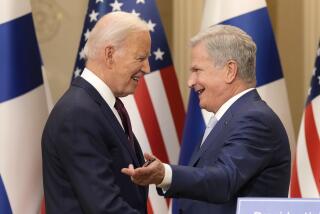Coming in From the Cold : The days of summitry and spies are fading in Finland. But that’s fine with Ambassador Derek Shearer. He’s into selling America.
- Share via
ELSINKI — As Derek Shearer tells it, the first thing that struck his family upon arriving in Finland--a Nordic country of which at least a third is within the Arctic Circle--is how much it’s like Southern California.
“We came in the summer when people were on roller-blades skating along the waterfront. They collect classic American cars here and we saw a lot of ‘50s Chevies,” Shearer recalled recently. “Finland, generally, is the most American-like of all European countries, so Helsinki felt just like Santa Monica.”
Well, for a time maybe. Like during the two-month-long summer day when the sun doesn’t set.
Otherwise, Helsinki seems about as far removed from a California beach city as one could get. And American ambassador to Finland seems just as unlikely a career move for the former Occidental College professor and Santa Monica city planning commissioner.
But Shearer is one of the original Friends of Bill, from their college days when his sister Brooke dated and then married Clinton’s Oxford roommate Strobe Talbott, now undersecretary of state. In the last presidential campaign, Shearer contributed to everything from Clinton’s economic plan to the mystery novels in the candidate’s battered leather briefcase for diversionary reading. For his loyalty and hard work, Shearer was appointed to the top diplomatic job here.
It might seem an unusual reward. Finland is still a great if somewhat pricey place for salmon and skiing. Everything works. The floor of a Saab automobile plant is clean enough for brain surgery. Everyone’s nice, like all the time. And nothing is more soothing than a Finnish sauna.
But Helsinki is, after all, not what it used to be. Gone are the days when Finland, courtesy of its neutrality and geography, was a center of summitry between American and Soviet officials. The big-name spies have been dispatched elsewhere. And the Western human rights movement, which made this city synonymous with fundamental freedoms after a series of international conferences in the 1970s produced the Helsinki Accords, now monitors abuses from inside Eastern and Central Europe.
Today, Shearer’s counterpart from Moscow is a born-again Christian. And the Russians are so poor that their Helsinki embassy no longer serves food at diplomatic receptions--or so anonymous Western envoys say.
In other words, Helsinki seems a great place to visit but not a hot spot for diplomacy--reflected in the fact that a highlight for Ambassador Shearer last fall was cutting the ribbon for the new Helsinki Planet Hollywood.
Yet Shearer, convincingly, argues otherwise. The American embassy in Helsinki, he contends, is a microcosm of the post-Cold War world as Finland redefines its identity and the United States redefines its diplomacy.
“The Cold War may be over, but Finland is even more important today,” he said during an interview in the elegant American ambassador’s residence he shares with his wife and two of their three children. “In the past, this country was only a venue. Now it’s a player.”
Finland formally ended half a century of refusing to align with either East or West when it joined the European Union in 1995. The only EU country that borders Russia, Finland is rapidly becoming a centerpiece in the growing northern European trade triangle combining the Baltic and Nordic countries with Russia as far as St. Petersburg.
“The economic potential of the region within a thousand kilometers [625 miles] of Helsinki is tremendous. This is a market of over 100 million people,” Shearer said in a speech to the Helsinki School of Economics last year. “St. Petersburg was Peter the Great’s opening to the West. It can be again.”
And Shearer, an economist who also served briefly in the U.S. Commerce Department, is trying to ensure that American interests are represented. “The kind of work increasingly that the ambassadors of the United States are doing involves economics,” he noted in the speech.
Last month, for example, he was an instrumental force behind an agreement that will boost the new American-Finnish Society. The deal calls for the Overseas Private Investment Corp. to provide insurance for Finnish and American joint ventures in the north European triangle.
“This is an example of the Finnish-American partnership to help create a zone of stability in northwest Russia and the Baltics,” Shearer explained during the interview.
*
Perhaps ironically, Shearer was a controversial appointment. He was labeled “a pedigreed radical socialist . . . alien to the American system” by the right-wing Center for Security Policy in Washington.
Suspicious of his past as an anti-Vietnam War activist at Yale University and as advisor to liberal former Gov. Jerry Brown and short-lived presidential hopeful Gary Hart, conservatives tried a filibuster to block the confirmation vote. That Shearer’s wife, Ruth Goldway, was mayor of Santa Monica from 1979 to 1983, the heyday of a progressive grass-roots movement in local government, probably didn’t help. Her agenda, including rent control and rigid restrictions on development, was described by supporters as “progressive” and by critics as “socialistic.” Shearer was her campaign manager.
In the end, however, Shearer got more confirmation votes in the Senate than did Talbott, the brother-in-law and State Department honcho who swore him in in mid-1994. And now Shearer is the epitome of restyled American diplomacy as he preaches Coca-Cola capitalism on lecture tours in northern Europe.
“I am a great friend of Coca-Cola,” Shearer tells students, businessmen and academics who come to hear him speak on “The American Way.” The soft-drink manufacturer has stimulated free markets and employment in places such as Romania, he explains, by encouraging the creation of small refreshment stands and kiosks that expand into established businesses.
“I like to think of Coca-Cola as part of not just the spread of American culture, but also the spread of the idea of enterprise around the world,” he told a group at the Swedish School of Economics.
*
Shearer also lectures on benevolent capitalism, citing the example of Ben & Jerry’s.
Several Finnish newspapers have retold Shearer’s tale of two unemployed men who started a company in an old Vermont gas station with nothing more than a handbook on how to make ice cream. Ben & Jerry’s decision to share profits with environmental and peace groups and to distribute booklets on “Caring Capitalism” in their shops has particularly appealed to Finns.
“I want to become known as the ambassador who brought Ben & Jerry’s to Finland,” Shearer told the Finnish paper Hufvudstadsbladet last year.
Instead of confronting rivals with America’s military might, U.S. diplomats are increasingly cooperating with allies or co-opting potential foes through American economic strength--on the theory that quality ice cream and such can be more persuasive than guns.
Shearer and Goldway, who had Helsinki atwitter with her cameo role as a cabinet member in the 1993 feature film “Dave” and who has put her political career on hold so she and her husband can work together, have already brought a little of California to Helsinki.
The ambassador’s residence, which like most Finnish homes has its own large sauna, is decorated with works by Los Angeles-area artists and personal friends such as Laddie John Dill, Linda Lyke and Jane Gottlieb. Two large oils by Betty Warner Sheinbaum, wife of Los Angeles publisher and politico Stanley Sheinbaum, hang in the living and dining rooms.
The couple has sponsored performers ranging from Harry Belafonte to the Los Angeles Philharmonic (led by its Finnish-born conductor, Esa-Pekka Salonen). And they even serve Peet’s coffee from the Bay Area at diplomatic dinners.
So what part of Southern California doesn’t Finland now have? “Maybe,” Shearer conceded, “it’s the palm trees.”
More to Read
Sign up for Essential California
The most important California stories and recommendations in your inbox every morning.
You may occasionally receive promotional content from the Los Angeles Times.












